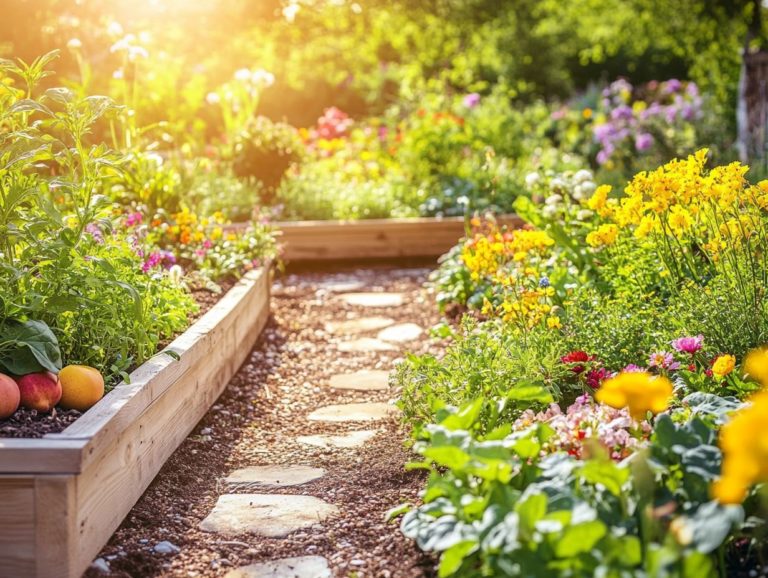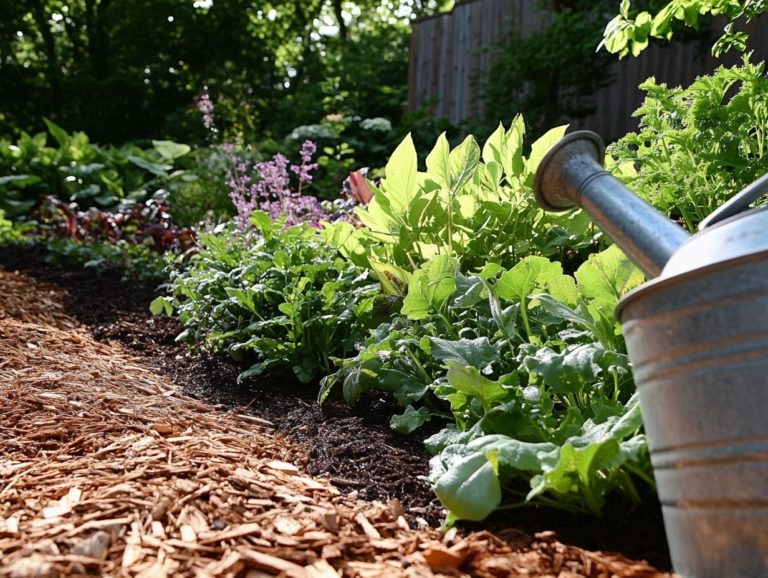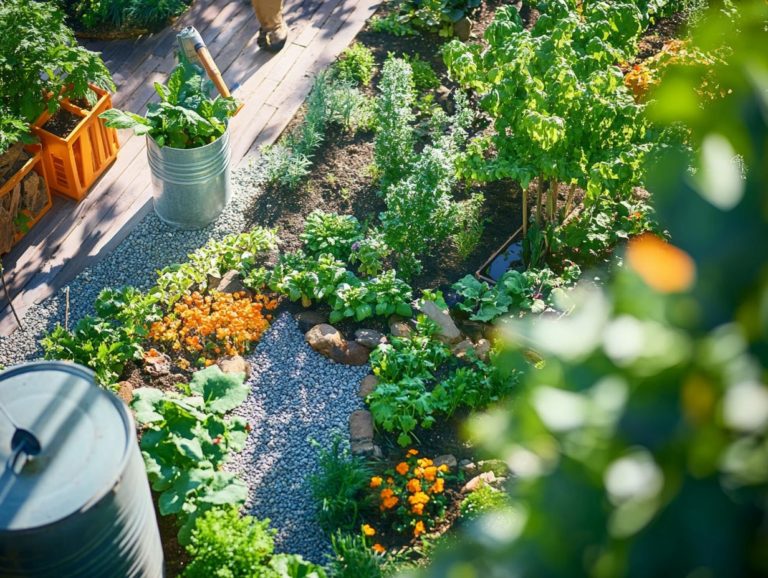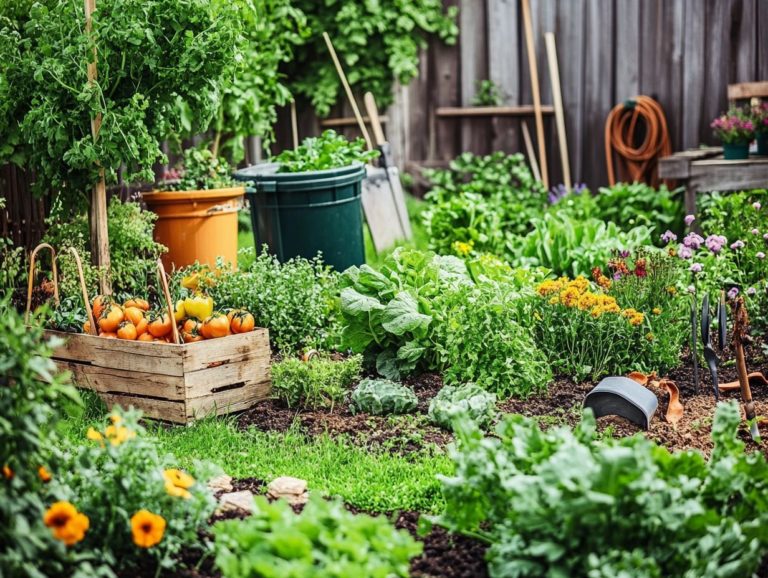What is the Role of Soil Microorganisms in Gardening?
In the realm of gardening, the spotlight often falls on plants, seeds, and sunlight, but beneath the surface lies a hidden army of tiny heroes: soil microorganisms.
These microscopic beings bacteria, fungi, and protozoa are essential players in nurturing healthy gardens, enhancing soil fertility, and defending plants against diseases. Recognizing their significance can revolutionize your gardening practices and yield extraordinary results.
This article delves into the vital roles of soil microorganisms, their contributions to plant growth, and how you can cultivate these allies in your garden for thriving outcomes.
Contents
- The Importance of Soil Microorganisms in Gardening
- The Role of Soil Microorganisms in Plant Growth
- Ways to Promote Soil Microorganisms in Your Garden
- Common Types of Soil Microorganisms
- Frequently Asked Questions
- Why Should You Care About Soil Microorganisms in Your Garden?
- How do Soil Microorganisms Help Break Down Organic Matter?
- What is the Nutrient Cycling Process in Gardening?
- Why are Soil Microorganisms Important for Plant Growth?
- How Can Gardeners Encourage the Growth of Soil Microorganisms?
- Are All Soil Microorganisms Beneficial for Gardening?
Key Takeaways:
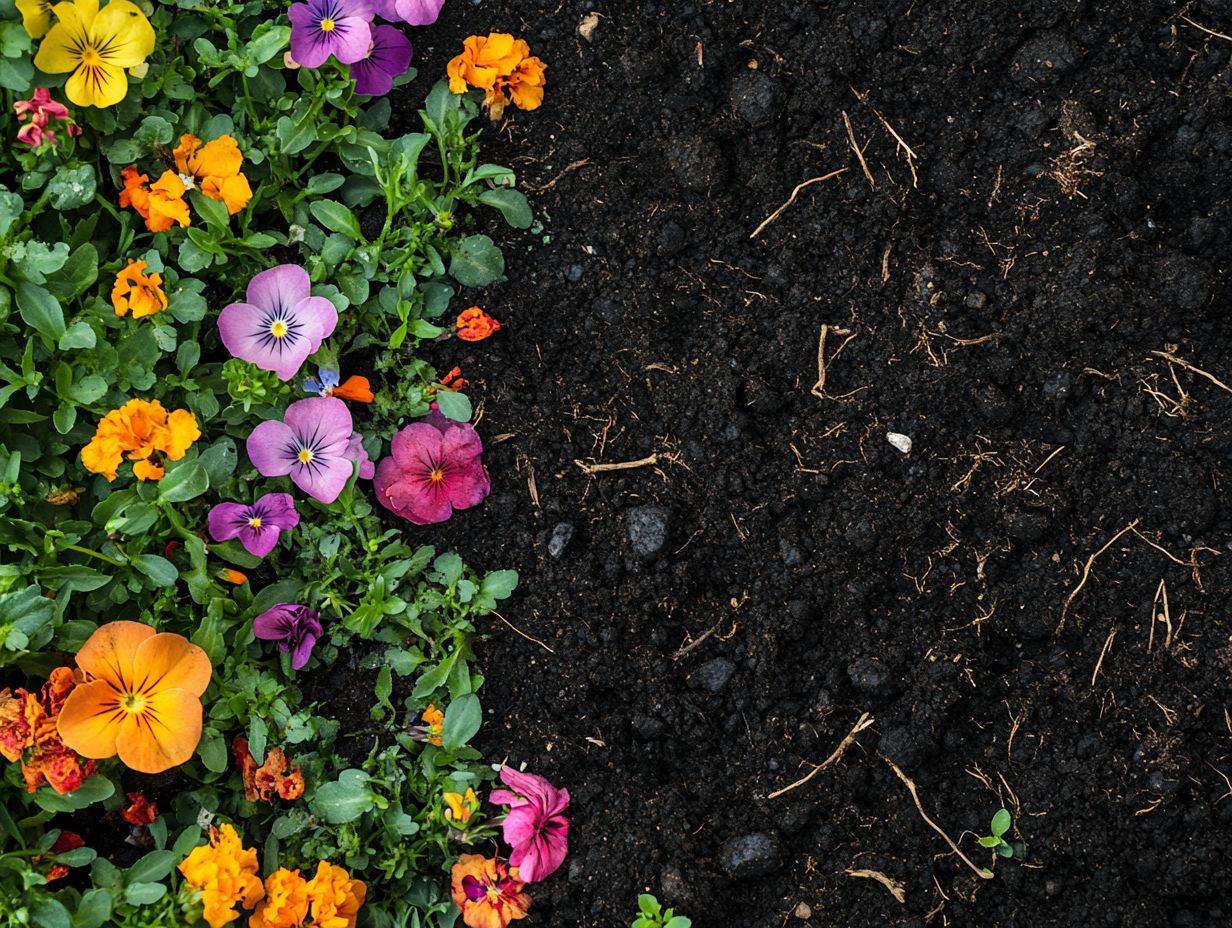
- Soil microorganisms play a crucial role in gardening by supporting plant growth through recycling nutrients and disease protection.
- Organic fertilizers and reducing harmful chemicals can promote the growth of beneficial soil microorganisms in your garden.
- Bacteria, fungi, and protozoa are the most common types of soil microorganisms that contribute to a healthy soil microbiome in your garden.
The Importance of Soil Microorganisms in Gardening
Soil microorganisms, like beneficial bacteria and fungi, are crucial for gardening success. They improve soil health and support strong plant growth, as noted by gardening experts like Jeff Lowenfels in the Anchorage Daily News.
These small but mighty organisms create a vibrant community of microbes in the soil. This community is essential for sustainable gardening practices, helping plants thrive and resist diseases.
What are Soil Microorganisms?
Soil microorganisms are a vital part of the soil food web, featuring a rich tapestry of entities like bacteria, fungi, and various microbial interactions that together nurture a vibrant ecosystem.
These minuscule powerhouses play crucial roles in recycling nutrients, breaking down organic matter, and establishing beneficial relationships with plants. For example, endophytic bacteria reside within plant tissues, boosting nutrient uptake and enhancing stress resistance. Mycorrhizal fungi, or fungi that help plants absorb water and nutrients, forge symbiotic partnerships with plant roots, facilitating the absorption of water and essential minerals.
Together, these organisms elevate soil fertility and enhance soil structure, making it more resilient against erosion and compaction. Their activities also help maintain ecological balance, promoting soil aeration and water retention both crucial for sustaining healthy plant systems.
Why are They Important for Gardening?
Soil microorganisms are absolutely essential for your gardening success. They enhance plant growth, improve soil health, and facilitate nutrient absorption key elements for achieving a flourishing garden.
These tiny creatures, including bacteria, fungi, and protozoa, play a vital role in breaking down organic matter, releasing the essential nutrients your plants crave for optimal growth. They establish symbiotic relationships with plant roots, allowing for more efficient nutrient uptake and bolstering your plants resilience against diseases and environmental stresses.
Their activities also contribute to maintaining ecological balance in your garden, promoting soil aeration and water retention both crucial for sustaining healthy plant systems. The intricate web of life created by these microorganisms ultimately supports a thriving garden ecosystem, ensuring that your plants receive the nourishment they need to truly flourish.
The Role of Soil Microorganisms in Plant Growth
Soil microorganisms play a pivotal role in your plant growth journey. They facilitate recycling nutrients, enhance soil fertility, and engage in nitrogen fixation key processes that support the development of robust plants and sustainable gardening practices.
By nurturing these microorganisms, you’re setting the stage for a thriving garden ecosystem.
Discover the magic of soil microorganisms! Start nurturing your soil’s tiny heroes today and watch your garden thrive!
Nutrient Cycling and Soil Fertility
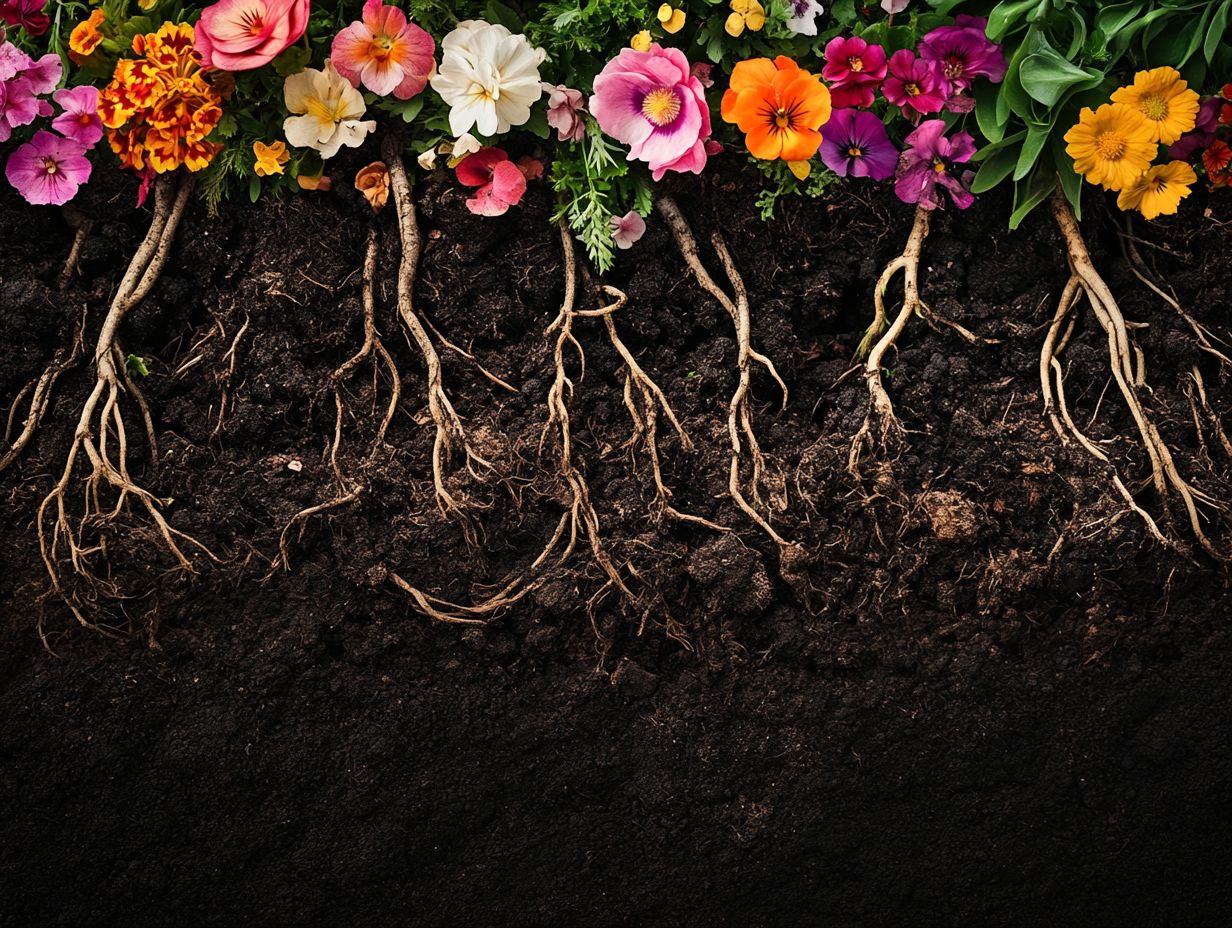
Nutrient cycling is a vital process that you can appreciate, carried out by soil bacteria and microorganisms that sustain soil fertility by converting organic matter into nutrients that plants can readily absorb.
This intricate process begins when organic matter, like decaying plant material, enters the soil. Soil bacteria and microorganisms break down this material through decomposition, a process that uses their enzymes.
As these microscopic champions metabolize complex organic compounds, they release essential nutrients such as nitrogen, phosphorus, and potassium back into the soil.
Not only does this enrich the soil, but it also enhances its structure, improving water retention and aeration. The availability of these nutrients is crucial for healthy plant growth, ultimately supporting both agricultural productivity and the sustainability of ecosystems.
Protection Against Diseases
Soil microorganisms play a pivotal role in enhancing your plants’ health by offering protection against diseases. Beneficial bacteria and fungi work together to create a robust ecological balance, effectively suppressing harmful pathogens.
By forming symbiotic relationships with plant roots, these advantageous microbes boost nutrient uptake. They also produce enzymes and metabolites that can directly inhibit pathogenic organisms.
They skillfully outcompete harmful microbes for vital resources like nutrients and space, thereby curbing the chances for pathogens to thrive. Some beneficial species even stimulate your plant’s own defense mechanisms, promoting systemic resistance, which is a plant’s built-in ability to fight off diseases.
The overall health of your soil is essential in this intricate dance. Diverse microbial communities flourish in nutrient-rich, well-aerated environments, leading to enhanced plant vigor and resilience against diseases.
Ways to Promote Soil Microorganisms in Your Garden
You can enhance the presence of beneficial soil microorganisms in your garden through a variety of effective strategies. Consider incorporating organic fertilizers and compost into your routine while also embracing sustainable gardening practices.
By minimizing the use of harmful chemicals, you create a thriving ecosystem that nurtures the vital microorganisms essential for a healthy garden.
Using Organic Fertilizers and Compost
Utilizing organic fertilizers and compost enriches your soil with organic matter. This enhances the activity and diversity of vital soil microorganisms essential for nutrient cycling.
Meet your soil’s heroes: bacteria, fungi, and protozoa! They break down organic materials, releasing essential nutrients in forms that your plants can readily absorb.
By adopting these natural amendments, you can cultivate a thriving ecosystem in your soil, where beneficial microbes not only improve soil structure but also enhance its fertility over time.
This process helps create a more resilient garden, one that can withstand pests and diseases, effectively reducing your reliance on synthetic inputs. Ultimately, these practices contribute to sustainable gardening and promote the long-term health of both your soil and plants.
Reducing Harmful Chemicals
Reducing harmful chemicals in your gardening practices is essential for preserving soil health and supporting the vital role of soil microorganisms in maintaining ecological balance.
These microorganisms bacteria, fungi, and protozoa are critical players in nutrient cycling and soil structure, both of which are vital for healthy plant growth.
When agricultural chemicals seep into the soil, they disrupt these organisms, causing a decline in biodiversity and compromising soil fertility.
Start using sustainable gardening methods today! Embrace organic composting and crop rotation to rejuvenate your garden.
These practices not only nurture healthier plants but also enhance water retention and soil aeration, creating a more robust environment that supports long-term agricultural productivity.
Common Types of Soil Microorganisms

Common types of soil microorganisms include bacteria, fungi, mycorrhizal fungi (a type of fungus that helps plants absorb nutrients), protozoa, and nematodes. Each of these entities plays a unique role within the soil ecosystem, contributing to the health and vitality of the soil.
Understanding their distinct functions can enhance your approach to soil management and sustainability.
Bacteria, Fungi, and Protozoa
Bacteria, fungi, and protozoa are the stars of the soil microbial world! They play crucial roles in enhancing soil health and nutrient absorption. You ll find that they form a diverse and dynamic community essential for healthy plant growth.
Each microorganism has its special role, working together in harmony. For instance, bacteria excel at breaking down organic matter, transforming nutrients into forms that plants can easily absorb. They also fix nitrogen, which is critical for plant development.
Fungi also decompose complex organic materials and forge symbiotic relationships with plant roots. This partnership facilitates nutrient exchange and boosts water retention. Protozoa, though small, are vital too! They feed on bacteria and organic debris, releasing nutrients back into the soil and helping maintain balance within the microbial community.
The interplay of these organisms creates a thriving garden environment, underscoring the importance of cultivating microbial diversity for abundant yields and sustainable agriculture practices.
The Importance of Maintaining a Healthy Microbiome in Your Garden
Maintaining a healthy microbiome in your garden is essential for promoting soil health. Embracing sustainable agricultural practices enhances microbial interactions and supports overall plant growth.
These minuscule organisms play a vital role in nutrient cycling. They help plants absorb essential minerals while breaking down organic matter to enrich the soil. A thriving microbial community can enhance water retention, reduce reliance on agricultural chemicals, and even protect your plants from diseases.
Here are some effective practices to maintain this biodiversity:
- Crop rotation
- Composting
- Minimizing the use of chemical pesticides
By learning about these techniques, such as gardening education and understanding the roles of soil microorganisms, you not only nurture a flourishing garden but also contribute to a more resilient ecosystem. This highlights the beautiful reciprocal relationship between healthy soil and thriving plants.
Frequently Asked Questions
Why Should You Care About Soil Microorganisms in Your Garden?
Soil microorganisms play a crucial role in gardening by breaking down organic matter, cycling nutrients, and promoting plant growth. This process ultimately supports the entire garden ecosystem.
How do Soil Microorganisms Help Break Down Organic Matter?
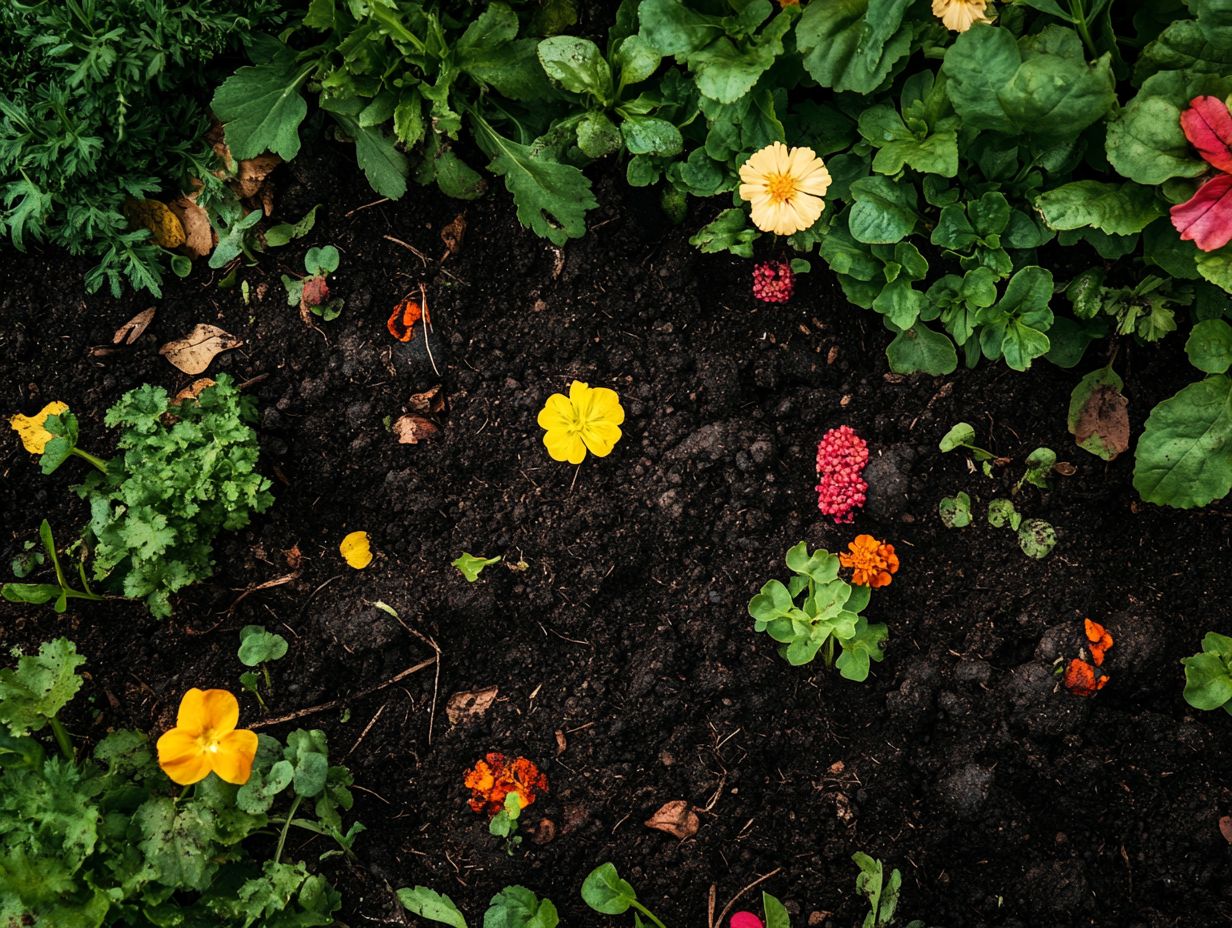
Soil microorganisms, such as rhizobia bacteria and fungi, secrete enzymes that break down complex organic matter into simpler forms. This process allows plants to absorb vital nutrients more easily.
What is the Nutrient Cycling Process in Gardening?
Nutrient cycling, also known as nutrient recycling, is when soil microorganisms break down organic matter and release essential nutrients, such as nitrogen, phosphorus, and potassium, back into the soil for plant uptake. This process is crucial for maintaining soil fertility.
Why are Soil Microorganisms Important for Plant Growth?
Soil microorganisms help promote plant growth by improving soil structure, increasing nutrient availability, and protecting plants from harmful pathogens. This is essential for a healthy and productive garden.
How Can Gardeners Encourage the Growth of Soil Microorganisms?
Gardeners can encourage the growth of soil microorganisms, including mycorrhizal fungi, by adding organic matter like compost, mulch, and cover crops. These materials serve as food sources for these beneficial microorganisms.
Are All Soil Microorganisms Beneficial for Gardening?
Not all tiny organisms in the soil are good for your garden. Some help plants grow, while others can cause diseases.
It’s crucial to maintain a healthy soil environment for successful gardening. This balance can lead to thriving plants and a bountiful garden.



